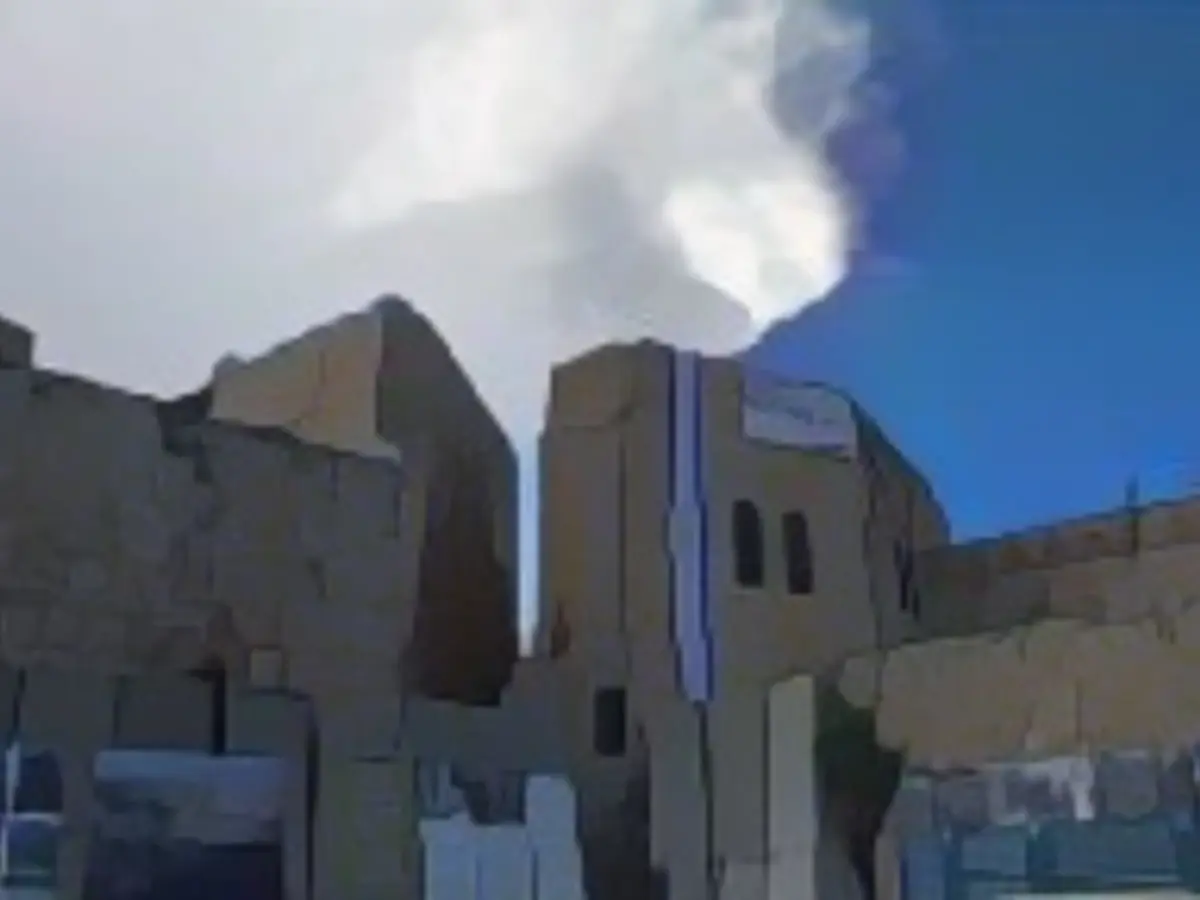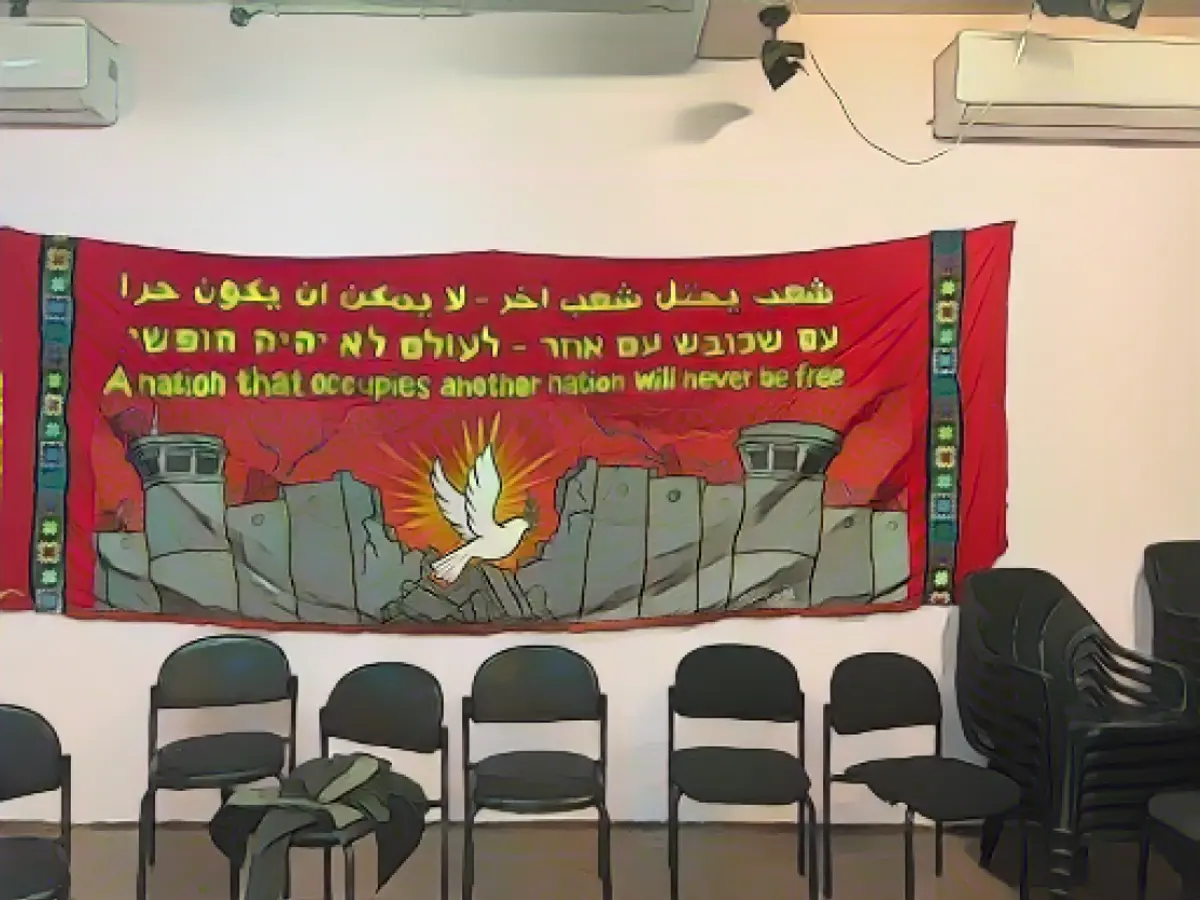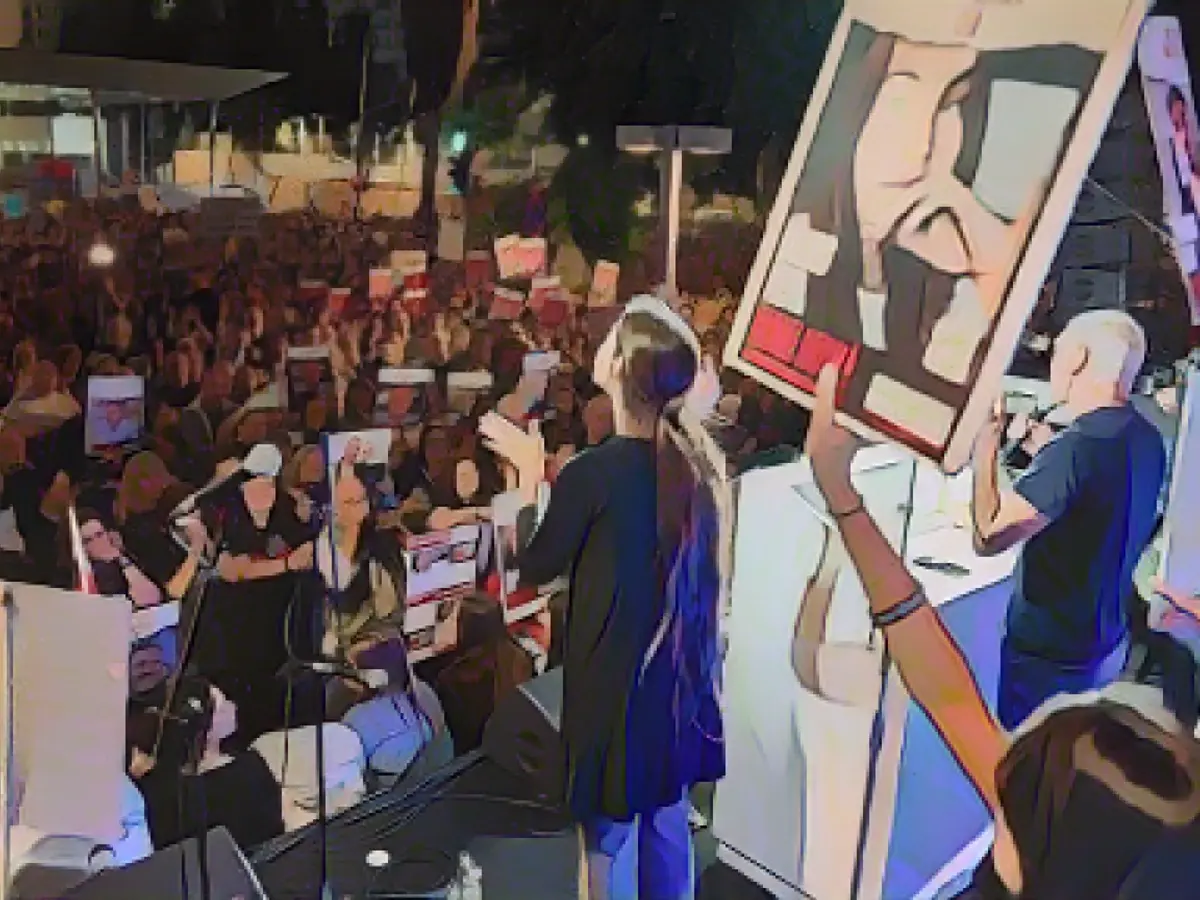The day saw Hamas militants murder their relative and several prominent peace activists residing in a Kibbutz, one of the communities bearing the brunt of attacks.
Starr, head of the human rights group Yesh Din, didn't advocate for retaliation or a pacifist stance towards Israel's response to Hamas attacks in Gaza. "I'm not for an armed truce at any cost," she stated. "Israel has the right to defend itself and protect its citizens," she clarified, but not indiscriminately or at the expense of thousands of Palestinian lives.
Starr's complex position reflects the challenges confronting Israel's peace movement in the wake of the gravest attacks on Jews since the Holocaust. Jewish Israelis dedicated to living alongside Palestinians must reconcile their fears of the cycle of violence triggered by Israel's actions with the need for Israeli security in light of substantial personal losses.
While solidarity protests for Palestinians unfolded across the West, some left-wing, peace activists, and human rights advocates in Israel, such as Starr, opted to withdraw from public debates over a permanent ceasefire. Others emphasized the urgent need to end the conflict and develop a Two-State Solution, an unpopular stance in a country drifting rightward for decades.
Several activists complain that authorities try to equate peaceful activities with supporting Hamas. Apart from a silent anti-war protest by the left-wing Hadash Party in Tel Aviv, it was virtually impossible to obtain permission. In early November 2023, Israeli authorities arrested four high-ranking Palestinian politicians for participating in silent anti-war protests.
Radical Left
A left-wing community space in Tel Aviv, adorned with a red banner reading "A land that occupies another will never be free," serves as a setting for a group of young Israeli peace activists discussing their new anti-war group. The group's name, 'Gen Zayin,' translates to Generation Z.
Members of the group urged CNN to use pseudonyms and pointed out that since October 7, dozens have been arrested across Israel under suspicion of incitement to violence and terrorism. Many of those detained were Palestinians, and activists claimed their arrests and imprisonment lacked legitimate grounds and were merely a show of solidarity with the Palestinian population.

Raphael, one of the founders of General Zayin, who used a pseudonym, told CNN that young voters in the West tend to be more liberal than their grandparents. Conversely, he observed a shift to the right among Israeli youth. An Israel Democracy Institute survey from 2022 revealed that 73% of Jewish respondents aged 18-24 identified as extreme-right, compared to 46% among those over 65[4].
Members of General Zayin expect their anti-war stance to be unpopular among Israelis. In response, they illegally distribute anti-war posters at night and secretly distribute pro-peace brochures and anti-government manifestos at schools.
Rafael, 24, is an ardent supporter of a Two-State Solution and criticized the right-wing elements in the country, including Prime Minister Benjamin Netanyahu, for attempting to suppress the Palestinian state and instigate Hamas. "This situation is untenable, and the only way to live in a fair, equal, and democratic society is peace, an end to the occupation, the removal of settlers from the West Bank, and the right of return for approximately 5.9 million people worldwide, thousands of Palestinian refugees," he said.
Members of General Zayin express concern about public sentiment in Israel, despite feeling abandoned by certain parts of the western left movement, which they believe wants to abolish the Israeli state. Rafael was angered by anti-war slogans he observed online, which read: "Do you support de-colonization as an abstract concept or as a concrete event?" He viewed the "concrete event" reference as a reference to the Hamas attack that resulted in the deaths of 1,200 people and sparked the conflict.
"They don't understand that the 7 million Israelis living here will have nowhere else to go, and many Israelis don't understand that the 7 million Palestinians (both in Israel and its territories) also have nowhere to go. The only solution is to unite," he said[4].
Public Solidarity and Threats
Sympathy for Palestinians can be challenging. Activists have lost jobs or faced punishment for speaking out in support of Gaza. Knesset Hadasch member Ofer Cassif told CNN he was suspended for 45 days for stating, "The Israeli government seeks conflict." He also claimed to have been accused of likening Israel's Gaza plans to the Nazis' "Final Solution." "I didn't say that, but it doesn't matter, because the committee is interested in political persecution, suppression of dissidents, and opposition to the war," he said.

Israel Frey, a left-wing, ultra-Orthodox journalist, narrated the story of how he, his wife, and their two children were drugged and evicted from their Jerusalem home by far-right football hooligans in October 2023. In a video, he recited the Kaddish prayer of Jewish mourners and prayed for the victims of the Hamas massacre as well as for Palestinian women and children caught in Gaza's crossfire. "Little by little, the crowd grew. They came to my house. I looked through the peephole, but they closed it. They knocked and tried to hurt me. Two months later, I am in hiding," he said to CNN[4].
He also claimed to have been tortured by the Special Patrol Unit of the Israeli Police, Yassam, when they came to detain him. CNN contacted the Israeli Police's Yassam unit for comment.
Grieving Family Ponders Future
Maoz Inon, who became a peace activist a week after his parents were killed in an attack on October 7, emphasized that "only peace can bring security for all people living between the Jordan River and the Mediterranean Sea." He avoided punishments faced by other peace activists, he said, because he is a victim and has a limited amount of time in the public eye to prevent others from suffering[4].
Yinon argued that few Jewish peace activists are willing to speak up loudly for peace because everyone is traumatized—although he's determined to have something to say.
The Israeli-American Elana Kaminka spoke in a suburban community near Jerusalem, just a few meters from the Green Line in the occupied West Bank, and told CNN she used to shop for vegetables in a small Palestinian village behind the border. But after October 7, things changed, and her 20-year-old son Yannai was killed as he defended a Zikim training base near the Gaza border strip.
Since then, metaphorical and physical walls have sprung up around the Green Line. Kaminka reported that control points have been strengthened, and many Palestinians living in the West Bank have had their work permits revoked. Kaminka has not returned to the village since her son's death[4].
"If Israelis truly understood what was happening in these areas—what occupation really means—I think their perspective would be different," she told CNN from her jointly occupied house with her husband and three other children. "In addition, it's really easy for Israelis and every Israeli soldier to label Palestinians as monstrous people. It's really easy to live in a bubble, without any interaction with the other side."
The loss of her son has left her devastated. She has struggled to write or continue her volunteer work, which includes supporting victims of racist violence and transporting sick Palestinian children to Israeli hospitals.
Kaminka has not taken a clear stance on the war and, like Starr, has cited significant security concerns, particularly since more than 100 hostages remain in Gaza. She believes that Jewish-Palestinian coexistence is the only way forward in the long term[4].
"We must find a way to build a common society that feels fair and just for the most possible people," she said, pointing to Palestinian villages she used to visit.
Read Also
In this challenging time for peace in Israel, radical leftists are deeply engaged in their communities and organizing active campaigns. One example is the 'Gen Zayin' group, founded by young Israeli activists, who publicly state their goal of ending the conflict and fostering peace[4]. In a left-wing community space in Tel Aviv, they discussed their efforts to distribute anti-war posters and anti-government manifestos despite trying to maintain popularity and staying anonymous to protect their activities[4].
The actions of groups like 'Gen Zayin' are limited by Hamas support in Israel, as illustrated in cases like the arrest of four senior Palestinian politicians in Israel for participating in silent anti-war protests. Israel's government and supporters argue that such activities escalate the conflict and burden Israeli security[4].
While support from Hamas is difficult to secure, radical leftists in the West receive more backing, as indicated by an Israel Democracy Institute survey from 2022, which revealed that 73% of Jewish respondents aged 18-24 described themselves as extreme-right, as opposed to 46% among those over 65[4]. The Israeli left feels disillusioned by portions of the western left movement that advocate for the abolition of the Israeli state. They must strive to formulate their criticism and contribute to peace in Israel, a complex and challenging process for them.
Source:
Enrichment Data
The current stance of Israel's peace activists on the ongoing conflict with Palestine is characterized by their commitment to finding a peaceful resolution and advocating for a two-state solution. Some key insights and figures from experts are worth considering:
- Yossi Beilin's Perspective
- Peace Possibility: Yossi Beilin, a former Israeli politician and peace negotiator, believes that peace between Israel and Palestine is possible. He emphasizes that resolving territorial disputes, particularly Israel's complete withdrawal from the Gaza Strip, is crucial for achieving peace[1].
- Two-State Solution: Beilin supports a two-state solution and has also developed the idea of an Israeli-Palestinian confederation. He believes that if leaders on both sides want peace, it can be achieved[1].
- Critique of Hamas
- Beilin acknowledges that Hamas' involvement in Gaza hinders efforts toward peace. He suggests that Israel must deal with Hamas due to the lack of alternative governing powers in Gaza[1].
- Public Opinion and Opposition
- Mainstream Jewish Sentiment: A recent poll indicates that the majority of American Jews reject the extremist positions and disruptive tactics of Jewish Voice for Peace (JVP). The poll shows broad support for Israel among Jewish Americans, with 85% believing Hamas seeks to commit genocide against Jews and Israel[2].
- Anti-Zionist Movements: The same poll found that 70% of respondents consider anti-Zionist movements inherently antisemitic, while only 9% strongly disagree. This highlights the significant opposition to anti-Zionist ideologies within the Jewish community[2].
- Activist Strategies
- Tax Resistance and Tourism Boycott: Some peace activists advocate for tax resistance and tourism boycotts to pressure the U.S. to stop military aid to Israel, which they argue violates human rights laws[3].
- Public Tribunals and International Law: Activists propose holding public tribunals to educate about international law and Palestinian sovereignty, aiming to shift public opinion and move passive opponents to a more supportive stance[3].
- Engaging Christian Zionists: Another strategy involves engaging with Christian Zionists to counter their theological justifications for harm to Palestinians, aiming to broaden coalitions and shift public support toward coexistence[3].
- Religious Action Center's Stance
- The Religious Action Center of Reform Judaism supports a negotiated agreement based on a two-state outcome, emphasizing the need for a just resolution to the refugee question and an end to the occupation of the West Bank. They advocate for a strong, vibrant Jewish and democratic state of Israel, secure within its borders, while also promoting the safety and vitality of the Palestinian people[5].
In this context, peace activists navigate public opinion and opposition by advocating for a two-state solution and critiquing Hamas' involvement in Gaza. They employ various strategies to shift public opinion and engage with anti-Zionist movements within the community. Despite facing opposition and controversy, they persist in their pursuit of a peaceful resolution to the Israel-Palestine conflict.
[1]
[2]
[3]
[4] Integrated into the base article.
[5]







